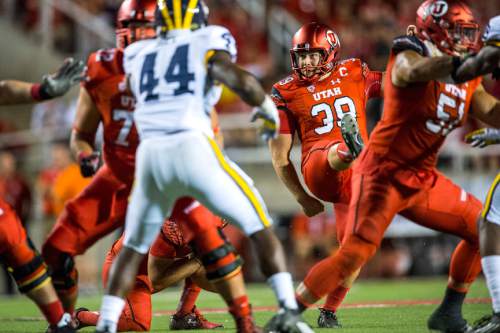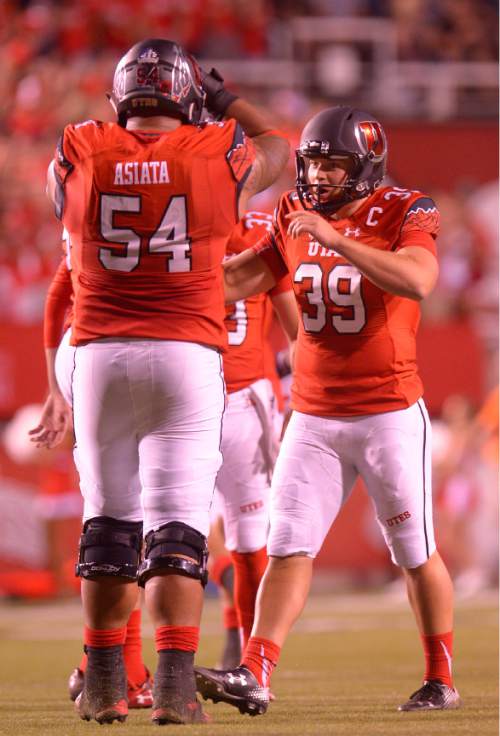This is an archived article that was published on sltrib.com in 2015, and information in the article may be outdated. It is provided only for personal research purposes and may not be reprinted.
For those who knew nothing else about the 2014 Utah football team, there were two things to remember.
One: The Utes had outstanding special teams play on kicks, punts and returns.
Two: They led the nation in sacks.
After wins against Michigan and Utah State, it seems Utah hasn't adopted the same identity. The defense has been credited with two sacks, and the special teams aren't that special. While the Utes have still been winning, they're looking for those defining traits which made them a 9-4 team last year to resurface.
One of the biggest areas has been special teams, where the Utes have been 2 for 4 on field goals and so-so on punts. The specialists that were regarded as the strongest elements of the team have been brought down to earth.
Senior punter Tom Hackett, winner of the Ray Guy Award, had 10 touchbacks all season in 2014. He already has two this season. Against Utah State, he had six punts but only placed one inside the opposing 20. His net punting average has dipped slightly.
What gives?
"I am human," he said. "I do make mistakes."
That was easy to forget last season. Hackett was able to help Utah consistently win field position battles and neutralize top returners. Not that he's been bad — he's still third in the Pac-12 in net punt yards — but his punting has felt a little more … average.
There's a way of explaining that: Hackett has faced more two returner sets, and the Utes have elected to punt out of their base punt formation rather than rugby style, which is more or less Hackett's specialty. The results have been better in practices than they have been in games, special teams coordinator Morgan Scalley said.
Similarly, Phillips has heard the same kind of criticism after going 1 for 3 in his first game on field goal attempts. Both misses were over 40 yards, but that didn't stop some fans from calling for another option from the kicker who entered the season with 83 percent career accuracy. Phillips rebounded by making his only field goal attempt last week.. Scalley hopes that's the beginning of a trend.
"I don't think we win that many games last year if our special teams aren't that good," he said. "It's always going to be a part of the plan to win as long as Coach Whittingham is here."
Another part of the plan is quarterback pressure, which has been a little hard to get at times this season. The Utes made it a game-and-a-half before notching their first sack this year, a timely takedown by Pita Taumoepenu that forced a fumble from Utah State while deep in Utes territory.
The lack of sacks — which the rest of the Pac-12 is experiencing as well — can be chalked up in part to quicker releases by quarterbacks and more overall protection by opponents. The Utes also miss the speed of Nate Orchard, who had 18.5 sacks last year. The Utes have been a bit conservative, and Kyle Whittingham said it's likely the team will dial up more blitzes in upcoming weeks.
But there is another stat that redeems the defensive line in part: five interceptions. Watching film, it's been hard for Utah to separate the picks from the pressure.
"A lot of them are coming from pressure from our D-line," defensive end Kylie Fitts said. "The first one [from Chuckie Keeton to Marcus Williams], Hunter [Dimick] was right in his face as he threw. It was a good play. The other, Jason [Fanaika] and Pita were right there."
There's a split-second difference between a sack and hitting the quarterback. The Utes have done plenty of the latter. And that makes a difference, leaving balls up in the air for guys like Marcus Williams (2 interceptions) to pick off.
There's also been a lot of play in base defense, and that might change soon.
"The sacks will come," Scalley said. "They'll come."
Twitter: @kylegoon





